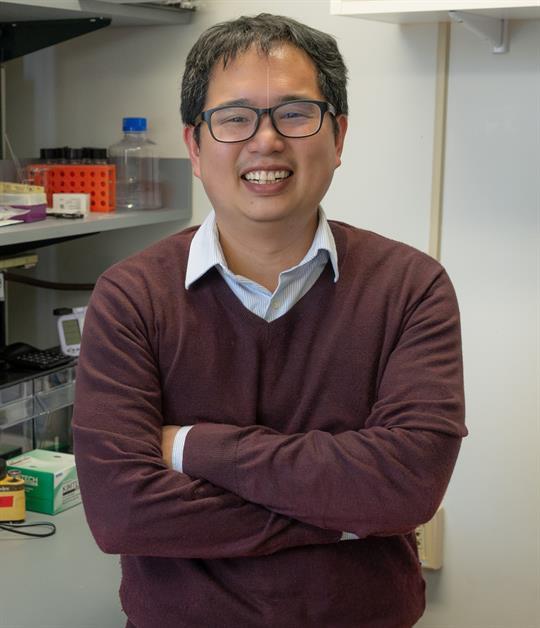-
About
- Leadership & Faculty
- News & Events
-
Admissions
-
Academics
- Graduate
- Advanced Clinical Training
- Continuing Education
- Academic Departments
- Academic Offices
- Simulation Experiences
-
Student Life
- Offices
-
Research
-
- Transformative Research
- Centers & Shared Resources
-
-
Hospitals & Clinics
- Emergency Care
- Hospital Services
-
Community Outreach
- Volunteer

Research/Areas of Interest
Microbiological, Ecological, and evolutionary drivers of vector-host-pathogen interactions; Molecular mechanisms of vector-borne pathogen transmission by wildlife reservoir animals; Vaccine and Prophylaxis development against Lyme disease and other vector-borne diseases.
Education
- Ph.D., Cornell University, College of Veterinary Medicine, Ithaca, United States, 2010
- MS, National Taiwan University, Taipei, Taiwan, 2003
- BS, National Cheng Kung University, Tainan, Taiwan, 2001
Biography
Yi-Pin Lin, Ph.D. is an Associate Professor in the Department of Infectious Diseases and Global Health. Trained as a microbiologist to study bacterial pathogenesis, he is studying how pathogen-host-vector interactions impact vector-borne pathogen transmission using multi-disciplinary approaches, including Microbiology, Immunology, Ecology, and Evolutionary biology. Establishing Lyme disease bacteria and ticks as a model, he is identifying the pathogen and host determinants that control the reservoir host preferences (also known as host tropism) of pathogens in dictating Lyme disease bacterial transmission in nature. He is also targeting these determinants to develop vaccines and immunotherapeutics for the prevention of Lyme disease and other tick-borne diseases and investigating the underlying protective mechanisms.
Dr. Lin received a Ph.D. degree from Cornell University, College of Veterinary Medicine in 2010 and continued his study on adhesion and colonization mechanisms of Lyme disease bacteria as a postdoctoral fellow under Dr. John Leong at Tufts University School of Medicine. In 2016, he began his independent career as a Research Scientist IV at Wadsworth Center, New York State Department of Health, and Assistant Professor at SUNY Albany to study the Ecological, Evolutionary, and microbiological drivers of host tropism for Lyme disease bacteria. He was promoted to Research Scientist V/Associate Professor in Wadsworth Center in 2022 before joining Tufts University School of Veterinary Medicine in 2024.
Dr. Lin received a Ph.D. degree from Cornell University, College of Veterinary Medicine in 2010 and continued his study on adhesion and colonization mechanisms of Lyme disease bacteria as a postdoctoral fellow under Dr. John Leong at Tufts University School of Medicine. In 2016, he began his independent career as a Research Scientist IV at Wadsworth Center, New York State Department of Health, and Assistant Professor at SUNY Albany to study the Ecological, Evolutionary, and microbiological drivers of host tropism for Lyme disease bacteria. He was promoted to Research Scientist V/Associate Professor in Wadsworth Center in 2022 before joining Tufts University School of Veterinary Medicine in 2024.